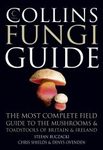By: Masaharu Tsuji(Editor), Tamotsu Hoshino(Editor)
139 pages, 5 plates with colour photos; b/w photos, b/w illustrations, tables
![Fungi in Polar Regions Fungi in Polar Regions]()
Click to have a closer look
About this book
Contents
Customer reviews
Biography
Related titles
About this book
Fungi that inhabit polar-region can grow and decompose organic compounds under subzero temperatures play important roles in the nutrient cycle of polar-region ecosystems. Thus, changes in the mycoflora affect the ecological recycling in these regions, and understanding the cold-adaptation strategies of fungi under extreme environments is critical for a better understanding of polar-region ecosystems. Due to their ability to survive under extreme environments, fungi in polar-region are seen to show potential for utilization in biotechnologies. Fungi in Polar Regions presents our current understanding of the mycoflora in polar-region and their cold adaptation strategies, and applied studies using their abilities.
Contents
- An Index of Non-lichenized Fungi Recorded in the Vicinity of Syowa Station, East Antarctica / Masaharu Tsuji
- Diversity and Ecology of Fungi in Polar Region: Comparisons between Arctic and Antarctic Plant Remains / Takashi Osono, Shunsuke Matsuoka, Satoru Hobara, Dai Hirose and Masaki Uchida
- Snow Molds and their Antagonistic Microbes in Polar Regions / Tamotsu Hoshino, Hisahiro Morita, Yuka Yajima, Masaharu Tsuji, Motoaki Tojo and Oleg B. Tkacehnko
- Pathogenic Fungi on Vascular Plants in the Arctic: Diversity, Adaptation, Effect on Host and Ecosystem, and Response to Climate Change / Shota Masumoto
- DNA Metabarcoding for Fungal Diversity Investigation in Polar Regions / Shunsuke Matsuoka, Yoriko Sugiyama and Hideyuki Doi
- Oomycetes in Polar Regions / Motoaki Tojo
- Biotechnological Potentials of Arctic Fungi / Purnima Singh and R. Kanchana
- Dairy Wastewater Treatment under Low-Temperature condition by an Antarctic Basidiomycetous Yeast / Masaharu Tsuji, Sakae Kudoh and Tamotsu Hoshino
- Ethanol Fermentation by the Basidiomycetous Yeast Mrakia blollopis Under Low Temperature Conditions / Masaharu Tsuji and Tamotsu Hoshino
Customer Reviews
Biography
Masaharu Tsuji worked at the Hokkaido centre, National Institute of Advanced Industrial Science and Technology as a technical staff member with Dr Tamotsu Hoshino in 2009. He was awarded a PhD degree in Agriculture from Iwate University, Japan, in March 2015. In April 2015, he joined the Biology group, National Institute of Polar Research as a Project Researcher. His current research interests include mycoflora in the polar region, cold adaptation strategies for them and utilization of their potential for biotechnology.
Tamotsu Hoshino received PhD in fungal biotechnology from the Graduate School of Agriculture, Nagoya University in 1992. He has developed ecophysiological characteristics of fungal cold adaptation from snow moulds in the Arctic to Antarctica via Siberia. His research interests include cold adaptation of fungi from molecular to ecological level, speciation of fungi in cold environments and effects of climate change on cold-adapted fungi. He was a Board Member of Trustees of Mycological Society of Japan (2013-2016).
By: Masaharu Tsuji(Editor), Tamotsu Hoshino(Editor)
139 pages, 5 plates with colour photos; b/w photos, b/w illustrations, tables




































